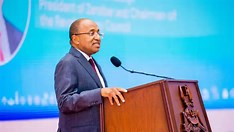Oil & Gas
PRESIDENT HUSSEIN ALI MWINYI CALLS FOR REGIONAL PETROLEUM FUND TO BOOST OIL, GAS INDUSTRY.
JUMA SULEIMAN

Zanzibar President Hussein Ali Mwinyi has urged East African Community (EAC) member states to fast-track the establishment of a dedicated petroleum fund to address financing challenges and accelerate the development of the region’s oil and gas industry. Speaking at the closing ceremony of the 11th East African Petroleum Conference and Exhibition 2025 (EAPCE’25) in Dar es Salaam, Dr. Mwinyi emphasized the need for financial independence in petroleum projects. “Inadequate funding remains a major bottleneck in the region’s petroleum industry. Establishing a petroleum fund will help us navigate financial hurdles caused by global activism and shifting priorities of traditional financiers,” he said.
Dr. Mwinyi noted that environmental activists worldwide have been pressuring financial institutions to halt funding for fossil fuel projects, making it difficult for African nations to secure resources for their oil and gas ventures. He referenced past opposition faced by the East African Crude Oil Pipeline (EACOP) project, which encountered strong resistance from environmental groups in France and beyond. “At a time when global activists intensify their opposition to financing fossil fuel projects and export credit agencies increasingly hesitate to support them, we must ask ourselves: How do we, as partner states, overcome these challenges?” he posed.
Citing the Africa Petroleum Producers’ Organisation (APPO) and the African Export-Import Bank (Afreximbank) as models, Dr. Mwinyi highlighted the Africa Energy Bank (AEB) as a solution to the financing crisis in Africa’s oil and gas sector. He stressed the need for regional collaboration in establishing infrastructure such as the Tanzania-Kenya and Tanzania-Uganda pipelines to maximize petroleum potential. “The East African Crude Oil Pipeline Project (EACOP) is a landmark project, and we need to see more initiatives of its kind materializing,” he said.
Tanzania’s Deputy Prime Minister and Minister of Energy, Dr. Doto Biteko, supported the call for regional cooperation, emphasizing the importance of a petroleum fund to provide stable financing for infrastructure, research, and workforce training. Energy economist Dr. Michael Kamau echoed this sentiment, stating that “East Africa cannot afford to wait for international financiers to dictate the pace of its development.” As outlined in the EAC Vision 2050, Article 114 of the EAC Treaty emphasizes enhanced cooperation in managing natural resources. With growing global pressure against fossil fuels, East Africa must secure its financing mechanisms or risk stagnation in its petroleum sector.
